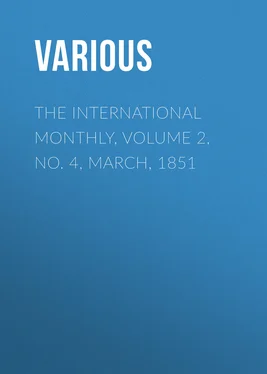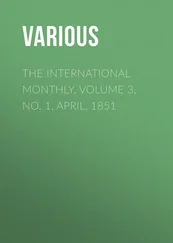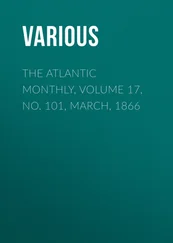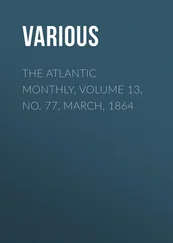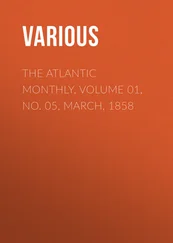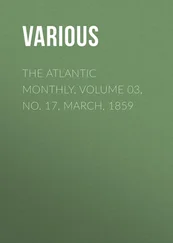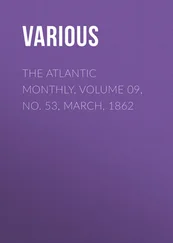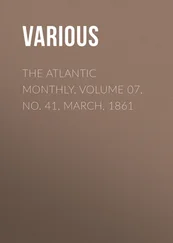Various - The International Monthly, Volume 2, No. 4, March, 1851
Здесь есть возможность читать онлайн «Various - The International Monthly, Volume 2, No. 4, March, 1851» — ознакомительный отрывок электронной книги совершенно бесплатно, а после прочтения отрывка купить полную версию. В некоторых случаях можно слушать аудио, скачать через торрент в формате fb2 и присутствует краткое содержание. Жанр: foreign_antique, periodic, foreign_edu, на английском языке. Описание произведения, (предисловие) а так же отзывы посетителей доступны на портале библиотеки ЛибКат.
- Название:The International Monthly, Volume 2, No. 4, March, 1851
- Автор:
- Жанр:
- Год:неизвестен
- ISBN:нет данных
- Рейтинг книги:5 / 5. Голосов: 1
-
Избранное:Добавить в избранное
- Отзывы:
-
Ваша оценка:
- 100
- 1
- 2
- 3
- 4
- 5
The International Monthly, Volume 2, No. 4, March, 1851: краткое содержание, описание и аннотация
Предлагаем к чтению аннотацию, описание, краткое содержание или предисловие (зависит от того, что написал сам автор книги «The International Monthly, Volume 2, No. 4, March, 1851»). Если вы не нашли необходимую информацию о книге — напишите в комментариях, мы постараемся отыскать её.
The International Monthly, Volume 2, No. 4, March, 1851 — читать онлайн ознакомительный отрывок
Ниже представлен текст книги, разбитый по страницам. Система сохранения места последней прочитанной страницы, позволяет с удобством читать онлайн бесплатно книгу «The International Monthly, Volume 2, No. 4, March, 1851», без необходимости каждый раз заново искать на чём Вы остановились. Поставьте закладку, и сможете в любой момент перейти на страницу, на которой закончили чтение.
Интервал:
Закладка:
'–a garden of his own,'
the flowers that had solaced his leisure hours when he was comparatively unknown. But Cromwell died, Charles returned, and Marvel's energies sprung into arms at acts which, in accordance with his principles, he considered base, and derogatory to his country. His whole efforts were directed to the preservation of civil and religious liberty.
It was but a short time previous to the Restoration that Marvel had been chosen by his native town to sit as its representative in Parliament. The Session began at Westminster in April, 1660, and he acquitted himself so honorably, that he was again chosen for the one which began in May, 1661. Whether under Cromwell or Charles, he acted with such thorough honesty of purpose, and gave such satisfaction to his constituents, that they allowed him a handsome pension all the time he continued to represent them, which was till the day of his death. This was probably the last borough in England that paid a representative. 1 1 The custom of paying members of the House of Commons for the loss of time and travelling expenses, was common in the seventeenth century; constituencies believed such equivalents necessary for the attention to their interests and wishes which a Parliamentary agent was expected to give. In the old Corporation books of provincial towns are many entries for payments to members of Parliament, and in some instances we find them petitioning to Government for disfranchisement, because they could not afford to pay the expenses of a Member.
He seldom spoke in Parliament, but had much influence with the members of both Houses; the spirited Earl of Devonshire called him friend, and Prince Rupert particularly paid the greatest regard to his councils; and whenever he voted according to the sentiments of Marvel, which he often did, it used to be said, by the opposite party, that 'he had been with his tutor.' Such certainly was the intimacy between the Prince and Marvel, that when he was obliged to abscond, to avoid falling a sacrifice to the indignation of those enemies among the governing party whom his satirical pen had irritated, the Prince frequently went to see him, disguised as a private person.
The noted Doctor Samuel Parker published Bishop Bramhall's work, setting forth the rights of kings over the consciences of their subjects, and then came forth Marvel's witty and sarcastic poem, 'The Rehearsal Transposed.' 2 2 Marvel's first exposé of Parker's false logic was in 1672, in the poem named above, which was immediately answered by Parker, and re-answered by Marvel, who appears to have had some private threat sent him, as he says his pamphlet is occasioned by two letters; one the published 'Reproof' of him by Parker in answer to his first attack; 'the second, left for me at a friend's house, dated November 3d, 1673, subscribed J. G., and concluding with these words:—If thou darest to print any lie or libel against Dr. Parker, by the Eternal—I will cut thy throat.' This last reply of Marvel's, however, effectually silenced Parker: 'It not only humbled Parker, but the whole party,' says Burnet, for, 'from the king down to the tradesman, the book was read with pleasure.'
And yet how brightly did the generosity of his noble nature shine forth at this very time, when he forsook his own wit in that very poem, to praise the wit of Butler, his rival and political enemy. Fortune seems about this period to have dealt hardly with him. Even while his political satires rang through the very halls of the pampered and impure Charles, when they were roared forth in every tavern, shouted in the public streets, and attracted the most envied attention throughout England, their author was obliged to exchange the free air, apt type of the freedom which he loved, for a lodging in a court off the Strand, where, enduring unutterable temptations, flattered and threatened, he more than realized the stories of Roman virtue.
The poet Mason has made Marvel the hero of his 'Ode to Independence,' and thus alludes to his incorruptible integrity:—
'In awful Poverty his honest Muse
Walks forth Vindictive through a venal land;
In vain Corruption sheds her golden dews,
In vain Oppression lifts her iron hand;
He scorns them both, and arm'd with Truth alone,
Bids Lust and Folly tremble on the throne.'
Marvel, by opposing the ministry and its measures, created himself many enemies, 3 3 'No stronger satire could be penned than that descriptive of the Court of Charles, in the poem called 'Britannia and Raleigh:'— 'A colony of French possess the Court, Pimps, priests, buffoons, in privy chambers sport; Such slimy monsters ne'er approach'd a throne Since Pharaoh's days, nor so defil'd a crown; In sacred ears tyrannic arts they croak, Pervert his mind, and good intentions choak.' But not only do the courtiers feel the lash, for when Raleigh implores Britannia to urge his duty on the king, and save him from the bad who surround him, she interrupts him with— 'Raleigh, no more! for long in vain I've try'd The Stuart from the tyrant to divide.'
and made himself very obnoxious to the government, yet Charles II. took great delight in his conversation, and tried all means to win him over to his side, but in vain; nothing being ever able to shake his resolution. There were many instances of his firmness in resisting the offers of the Court, in which he showed himself proof against all temptations.
We close our eyes upon this peaceful dwelling of the heroic senator, and imagine ourselves in the reign of the second Charles, threading our way into that 'court off the Strand,' where Marvel ended his days. We enter the house, and climbing the stairs even to the second floor, perceive the object of our warmest admiration. He is not alone, though there is no possibility of confounding the poet with the courtier. Andrew Marvel is plainly dressed, his figure is strong, and about the middle size, his countenance open, and his complexion of a ruddy cast; his eyes are of a soft hazel color, mild and steady; his eyebrows straight, and so flexible as to mould without an effort into a satirical curve, if such be the mind's desire; his mouth is close, and indicative of firmness; and his brown hair falls gracefully back from a full and noble forehead. He sits in an upright and determined manner upon an uneasy-looking high-backed chair. A somewhat long table intervenes between him and his visitor; one end of it is covered with a white cloth, and a dish of cold meat is flanked by a loaf of bread and a dark earthenware jug. On the opposite end is placed a bag of gold, beside which lies the richly-embroidered glove which the cavalier with whom he is conversing has flung off. There is strange contrast in the attitude of the two men. Lord Danby lounges with the ease of a courtier and the grace of a gentleman upon a chair of as stiff and uncomfortable an appearance as that which is occupied after so upright a fashion by Andrew Marvel.
"I have answered you, my lord," said the patriot, "already. Methinks there need be no further parley on the subject; it is not my first temptation, though I most fervently desire it may be the last."
The nobleman took up his glove and drew it on. "I again pray you to consider," he said, "whether, if with us, the very usefulness you so much prize would not have a more extensive sphere. You would have larger means of being useful."
"My lord, I should certainly have the means of tempting usefulness to forsake duty."
The cavalier rose, but the displeasure that flushed his countenance soon faded before the serene and holy expression of Milton's friend.
"And are you so determined?" said his lordship, sorrowfully. "Are you really so determined? A thousand English pounds are there, and thrice the sum—nay, any thing you ask–"
Читать дальшеИнтервал:
Закладка:
Похожие книги на «The International Monthly, Volume 2, No. 4, March, 1851»
Представляем Вашему вниманию похожие книги на «The International Monthly, Volume 2, No. 4, March, 1851» списком для выбора. Мы отобрали схожую по названию и смыслу литературу в надежде предоставить читателям больше вариантов отыскать новые, интересные, ещё непрочитанные произведения.
Обсуждение, отзывы о книге «The International Monthly, Volume 2, No. 4, March, 1851» и просто собственные мнения читателей. Оставьте ваши комментарии, напишите, что Вы думаете о произведении, его смысле или главных героях. Укажите что конкретно понравилось, а что нет, и почему Вы так считаете.
